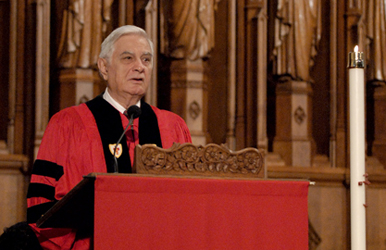Bill Kovach Urges Baccalaureate Celebrants to Challenge “Unjust Realities””
Prominent journalist pushes grads to shape and change the world

Bill Kovach, renowned journalist and the 2007 Boston University Baccalaureate speaker, urged this year’s graduates to become the teachers of the older generations and to “help us learn the new role of citizen journalist and gatekeeper of reliable information that will build a more informed public opinion around issues of public importance.”
Kovach, who was the New York Times Washington bureau chief, editor of the Atlanta Journal-Constitution, and curator of the Nieman journalism fellowships at Harvard University, told the crowd that packed Marsh Chapel on a rainy Sunday morning that the ongoing revolution in information and communication, sparked by the Internet, offered them unique opportunities to challenge the versions of “reality” promulgated by the powerful. Those realities, Kovach said in the soft Southern accent of his native Tennessee, are often “constructed with stereotypes, slogans, and selected ambiguous facts to lead us to predetermined conclusions.”
The Baccalaureate Service began with fanfares of brass and organ and a flurry of camera flashes. After the Reverend Dr. Robert Allan Hill, dean of Marsh Chapel, greeted the congregation, University Provost David Campbell read from the Gospel of John, and University President Robert Brown quoted Ecclesiastes — “For everything there is a season” — and told the crowd that “we are gathered here in the season of celebration at Boston University.”
Brown then introduced Kovach, now senior counselor to the Project for Excellence in Journalism, a research organization that uses statistics to study the press. Brown described Kovach as “the conscience of the press.”
Kovach told the audience that the loosening grip of centralized sources of news and entertainment, such as major media outlets, is leading to a new era of freedom. But he cautioned that “individual freedom is wasted unless it finds meaning in service to others,” and he urged the graduates to “be active, aggressive, and vocal participants in the debate and the decisions required of you as citizens.” At the same time, he said, the ability to rapidly sample opinions from individuals around the world via the Internet has opened up new possibilities of “tolerance and compromise.”
Kovach recounted a story of his early career, when he covered the civil rights movement. The courage of those marchers and protesters, he noted, had forced the unjust reality of legal segregation to collapse. Likewise, Kovach said, the critical thinking skills developed in college combined with today’s unprecedented access to information could be used to challenge other unjust realities and help “realize the ultimate promise of democracy — that the combined knowledge and experience of all the people can shape a more just and secure society.”
“I salute the achievement you celebrate this weekend,” Kovach concluded, “and welcome you and the contributions you will make to our new realities.”
Chris Berdik can be reached at cberdik@bu.edu.